- Home
- Antonia Fraser
Oxford Blood Page 15
Oxford Blood Read online
Page 15
In the prevailing silence - no one dared clap - Tiggie gave a loud titter: 'Oooh, there it goes again. Into the net. End of the set.'
At this point three things happened more or less simultaneously. Saffron flung up his racket in a whoop of triumph (the racket, unlike the net, was gleaming new): 'Six-four to the good guys. Well done, Cousin Fan.'
Lord St Ives went with great speed behind Tiggie's chair and started to help her up with the words: 'Come along, Antigone my dear.'
And Andrew Iverstone, with astonishing viciousness, aimed a ball hard at precisely that bit of wire netting which protected Tiggie's frail figure from the game's onslaught. 'Little bitch!' he shouted.
That in itself might not have mattered so much had the Saffron Ivy netting been of the high quality of, say, the Iverstone court at Henley. Only too clearly, it was not. The impact caused a large section of the blackened netting to fall to the ground, amid an unpleasant hail of rust. The ball itself struck Tiggie just as she was obediently rising to Lord St Ives' command. Shock, more than pain, must have caused her to give a short scream. Tiggie opened her large eyes and sucked her finger.
Jemima involuntarily looked towards the court. Andrew Iverstone stood panting and flushed as though struggling to master himself and resume the mantle of his manners. And on Jack Iverstone's face she saw a surprised look of absolute disgust, presumably at his father's behaviour, so strong as to amount to something close to hatred.
Jemima sighed. She pitied him.
'Daddy, don't be such a bad loser.' Fanny's bracing voice came as a positive relief. Jemima watched, fascinated, as the mask of impassivity came down again on Jack's face; there was now no trace of the strong emotion he had exhibited only a moment before.
'I'm terribly sorry.' Andrew Iverstone's voice was musical in its apology; he made a theatrical gesture with his hands. 'How could I be such an oat? Fanny's quite right. I'm the most awful loser.' He made it sound as if this was a charming eccentricity on his part. 'Antigone, are you all right?'
But Tiggie was being helped towards the house by Lord St Ives - 'I'll be back later for my game' - and Saffron, whose high spirits were quite unimpaired by recent happenings, was busy trying to do a breakdance on the court.
'Jemima, can you do this?' he called. Saffron made no attempt to follow Tiggie, nor for that matter did her mother. When Lord St Ives finally returned, dressed in ancient white flannels which in no way diminished his air of battered elegance, it was to find the little party at the court, spectators and exhausted players, waiting in a silence which still had a great deal of awkwardness about it.
'Now for the Golden Oldies!' cried Saffron, whose gyrations were by now quite unnerving.
'Personally, I need a fast runner for a partner, one who's going to take every shot in the front of the court. My dear boy, if you're to fill that role—' Lord St Ives looked pointedly towards Saffron, who was still standing on the top of his head '- do take care.'
'We'll take you on, Ivo. Fathers and sons. Jack and I against you and Saffron.' Andrew Iverstone stood up. He still looked heavily flushed. Jemima could understand why Daphne Iverstone began a tremulous protest.
'Oh darling, you know what the doctor said—'
She expected Andrew Iverstone, in spite of his state, to administer a sharp snap to his wife. Instead of which Iverstone hesitated, then smiled affably and sat down again.
'Damn it, she's right. Doctor's orders. Three sets and no more. As I intend to play tennis vigorously for the rest of my life, I have to pay attention.' He added pleasantly: 'I'll umpire. Take my revenge that way.'
That left Lord St Ives looking for a fourth player in the direction of Fanny, or perhaps Jemima. But Jemima, although she secretly rather fancied her tennis, thought that the opportunity for observation on this occasion was not to be missed. Tennis as a guide to character was a favourite preoccupation of hers. (Cass and Jemima for example had an on-going singles match in which Cass beat Jemima by strength and Jemima beat Cass by stealth.) She thought that she might get to know a little more about the character of Lord St Ives in the game which followed. The ruthlessness which must lie beneath the charm might perhaps be more clearly exhibited under the pressure of the game.
Who then was to be the fourth? Fanny and Jack together, it was felt, would make rather an uneven game: there were more polite references from Lord St Ives to his geriatric tennis. At which point Proffy suddenly stood up and said: 'I'll play.'
For the first time Jemima realized that he was wearing white tennis shoes (one black lace, one brown) with his loose grey flannel trousers for a purpose: she had imagined this detail to be further engaging proof of his absent-mindedness. Eugenia looked startled, gave the air of being about to say something: a third feminine protest to be joined to that of Lady St Ives which had failed and that of Daphne Iverstone which had succeeded. Then she sat back again in silence without speaking.
Proffy gambolled on to the court, looking more than ever like a bear that had lost its way: but he was obviously prepared for the game quite apart from the shoes, for he produced a pair of gold-rimmed plastic-lensed glasses from a pocket which he substituted for his habitual black-rimmed ones. Jemima remembered her original estimate of Proffy as a man whose absent-mindedness merely applied to those details of life which did not interest him (such as his wife's Christian name) and decided it had been correct.
She focussed her attention on the game. Yes, Lord St Ives could be said to be a ruthless, or at least competitive, player: although to be fair he was not nearly as competitive as Proffy, some of whose line calls were strangely reminiscent of those of Andrew Iverstone in the previous match - or perhaps the gold-rimmed spectacles were not as efficient as they looked. Otherwise she noted that Lord St Ives had a quick rather old-fashioned way of serving, with no great throwing up of the ball; true to his promise, he left all the running to Saffron; lastly his net play was lethal.
Jemima watched Proffy's surprisingly hard forehand drives being killed time and time again by Lord St Ives at net in a way that left even Jack - a fast runner and a fit one - no opportunity to reach them. Proffy's way of dealing with this was simply to hit harder - but he still aimed straight at Lord St Ives, as though mesmerized by the tall spare figure at the net. And Proffy's despair was comical.
'Insane, insane,' he kept muttering. 'Can't help aiming at him, can't help it.'
Since Lord St Ives continued to despatch these balls within his reach, Saffron twice won his service, erratic as its style remained. Jemima thought that Lord St Ives looked more like a gun at a shoot, polishing off driven grouse, than a tennis player. Then she remembered that he had been a noted shot in his day: no doubt an excellent eye explained his lethal performance, even at the age of seventy.
At this point a hard ball sent by Proffy actually hit Lord St Ives on the shoulder. As Proffy began to lumber forward, apologizing profusely, and Saffron galloped towards his father, Andrew Iverstone suddenly called out from the sidelines: 'That's your point, Proffy.'
'For heaven's sake, Daddy,' began Jack.
'Of course it's their point, Andrew. I'm aware of the rules. And I'm perfectly all right. No, Gwendolen, please do not call Binyon.' But for once Jemima had actually seen Lord St Ives' genial surface ruffled.
After this incident, there was a distinct rise in the level of the game's tension, which Jemima attributed directly to the presence of Andrew Iverstone sitting implacably, still rather flushed, behind the court's rusty netting.
Jack and Proffy were now leading five games to two, these two games representing Saffron's service. The games however had been closer than the score indicated: Lord St Ives in particular had played with still greater keenness following Proffy's blow and Andrew Iverstone's intervention. Proffy's own shots were getting wilder and rather less hard, as if the blow had upset him far more than his host, and something of the edge had gone off Jack Iverstone's play, possibly for the same reason. Lord St Ives and Saffron were definitely the improving couple, and only lo
st the seventh game after a series of deuces and a call from Proffy which was to say the least of it dubious.
It was Lord St Ives' turn to serve.
'He wants to win,' thought Jemima, 'or rather he does not want to lose.'
Then Andrew Iverstone called Lord St Ives' second serve out, just as Proffy, playing in the right-hand court, took a swipe at it. The swipe went into the net.
'Out,' he repeated.
'Balls,' said Saffron in a tone which was clearly audible. 'I must say I thought it was in,' said Jack in a mild tone to no one in particular.
Proffy panted and said nothing.
Lord St Ives said nothing either but simply crossed to the other court and prepared to serve again. The score was now love-fifteen. Lord St Ives served a double fault - very quickly, both balls delivered and into the net almost before Jack was ready to receive them.
Love-thirty. He recrossed, and served once again, too low, too quick, and straight into the net. But the second serve, surprisingly fast and also surprisingly deep, actually hit the white line close to Proffy's feet and Jemima herself saw the puff of chalk. The ball, both its pace and depth, obviously took Proffy completely by surprise; for one thing he was standing far too forward. He made no move to hit it.
It was this lack of movement which encouraged Andrew Iverstone to call out again from his deck chair: 'Out.'
'Was it out?' asked Lord St Ives in quite a sharp voice. He spoke to Proffy.
'Oh yes, absolutely out, absolutely. Wonderful serve all the same.' Proffy, apparently unaware of what was going on, spoke with great enthusiasm. 'Wonderful serve, but out.'
Love-forty. And set point.
Then Lord St Ives picked up a tennis ball and with much more grace than his cousin Andrew Iverstone at the end of the previous match, but with very much the same intent, hit it in a high parabola above the net. The ball bounced somewhere way outside the court. In no sense could the shot be interpreted as a serve.
'Set and match to you,' said Lord St Ives. 'Or rather we'll give it to you. I shan't bother with my second service.' He handed his racket to Saffron. 'Carry that for me, will you, old fellow? My shoulder is a bit painful.'
He walked off the court.
'You're quite right, Andrew,' were his next words, said with extreme good nature to the MP, still sitting in his deck chair. 'We really must get our court seen to. Will you give Gwendolen that address?'
Tennis, thought Jemima, was not the only game being played at Saffron Ivy. Some grimmer, more secret contest was also being played out.
15
Drawing Blood
Tiggie reappeared at dinner. She sat beside Saffron. She looked terrible and spoke not at all. It must have represented a considerable effort, Jemima thought, to have come down to dinner at all under these circumstances. Above the heads of the affianced couple hung another Lawrence, a sketch for the big double portrait of The Strawberry Children in the library, two youthful heads: compared to Tiggie, the Honble Miss Iverstone looked healthy and enchantingly pretty.
There were eighteen people at dinner, stretching down the long table, with its weight of glass and silver; the latter included a rococo silver centrepiece which on close inspection proved to represent a tortuous grove of trees, liberally entwined with the ivy which formed the family's crest. Ivy was also to be found on each separate dinner plate, together with the Iverstone family motto, whose Latin caused Jemima a moment's earnest but ultimately useless concentration.
'It means something like "Like the ivy, I protect my own walls",' said Lord St Ives genially, noting the direction of her gaze. 'Which is of course absolute nonsense, since ivy, if anything, pulls walls down.'
'A good motto, nonetheless. Haven't you rather lived by it?' Seeing Lord St Ives look slightly taken aback Jemima added with a politeness to match her host's own: 'As Foreign Secretary, I meant.'
Binyon, serving dinner, was assisted by a young man called Stephen, wearing a dark suit which did not fit, and an elderly man wearing a similar suit which did. Retainers. Assisting Lord St Ives - and Binyon - to protect the walls. To Jemima there was something faintly distasteful about an elaborately served banquet at which most of the guests were in their late teens and early twenties: the sight of the elderly retainer bending low to proffer a souffle dish to Saffron with the words - 'Haddock Souffle, my
lord' - struck her as against the natural order of things in which youth should minister to age.
'Come on, Saffer, don't take it all,' said a rather jolly young man simply called the Gobbler sitting opposite him; the Gobbler's interest in food was one of the running jokes of the Saffer set, Jemima observed, so that even the simplest remark of this nature issuing from his lips was greeted with gales of laughter. Everyone felt very disappointed if the Gobbler did not fill his plate to overflowing; just as the Gobbler showed equal disappointment if those around him did not try to seize the food back off his plate. Jemima had inadvertently contributed to the fun before dinner by mentioning a new series about gourmet food to be mounted by Megalith in the autumn.
It was pure courtesy which had led her to mention that there was an opening for a researcher on this particular series when the Gobbler made the more or less obligatory enquiry about openings in television, since she could hardly imagine the Gobbler or indeed any of those present at Saffron Ivy (except possibly Fanny) being able to hold such a job down.
'Is that the sort of thing that interests you?' The question was quite innocent. But as a result, when the hilarious laughter died down -Jemima thought Poppy Delaware would literally choke, she laughed so much - an extra running joke was added on the subject of the Gobbler and his television career.
'The Gobbler must do some research' became a rallying cry at the sight of any dish, to the untiring amusement of all the Oxford Bloods. From Jemima's point of view it was a relief to contemplate the only two outside guests, both male, both Cambridge dons, one quite young called Shipley and one very old called Leek. (Jemima dreaded to think what the Oxford Bloods would have made of such names, had they been the slightest bit interested in anybody's concerns at the dinner table other than their own ...)
The dons were sitting at the other end of the table, on either side of Lady St Ives. The function of Shipley was to make conversation to Eugenia Jones about classical tragedy. The function of Leek, less exhausting, was to listen to Proffy who addressed him about the problems of the Albanian Resistance in World War II over the head of a passive pretty girl called Nessa, last seen at the Chimneysweepers' Dinner, who seemed to be loosely attached to Bernardo.
Jemima surveyed the table and took a deep breath. She thought that the presence of the two dons, loquacious and silent respectively, would make the next stage of her investigation easier than the reverse. All the same, there was a certain risk in what she proposed to do. It was not a question of Cherry's briefing: she trusted Cherry to the hilt, even though Cherry's enthusiasm for the subject had not matched that of, say, the Gobbler, for gourmet food. No, the problem was Saffron. In order to carry out her plan, she had had to enlist his help. Even if she had not, he would soon have guessed her intention, so that to take him into her confidence was in another sense essential. All the same, she hoped that Saffron would keep a cool head.
Jemima had come to agree with Kerry Barber about the quality of Saffron's intelligence, even when it was cloaked with some deliberate affectation of idiocy. Yet there was nothing very cool about him this evening. On the contrary, he was in dangerously high spirits: she thought that already he had drunk more than most people would drink in a whole evening. Saffron drunk and indiscreet was capable of wrecking the whole plan.
At that moment, Saffron leant forward and in a voice which was almost perfectly casual asked: 'I say, Jemima, what's next?'
'Next?' Jemima excused herself politely from a conversation with Jack Iverstone about the possible unification of the SDP and the right wing of the Labour Party.
'When you've finished with us Golden Kids -' an audible groan f
rom Jack '- all right, holy cousin, we didn't call ourselves that. We're Marxists, as you know, or we were last term.'
'Oxford Bloody Marxist!' said Jack which for him sounded quite rude.
'We're anarchists now, Saffer,' Poppy Delaware interrupted sternly. 'Don't you remember that night after the Talking Heads concert? 'We got out our manifesto.' Poppy looked ravishing in a loose but extremely well-cut white linen dinner jacket, wing collar and narrow black tie; the only thing which was visibly anarchistic about her was her wildly streaky hair, in which silver and orange were only a few of the colours visible. Jemima knew that it was despicably sexist on her part but she could not summon up enormous interest in Poppy's political views; on the other hand, she would like to know where she got the dinner jacket.
'Anarchists, OK, yah. Well, what are you going to do next, Jemima?'
Saffron was not to be deterred.
'Now for something totally different. I'm working on a programme about blood as a matter of fact. No, not noble blood this time. Everybody's blood.'
She was conscious of the presence upstairs of that invaluable text-book, Blood Group Serology, 5th edition, procured by Cherry, together with Mourant's Blood Relations. What had the maid thought when she unpacked them? (They were placed conspicuously on her dressing table next to her make-up instead of beside her bed with the other books, as though of a vaguely pharmaceutical nature.) Jemima launched into her theme. Blood transfusions ... The need for more and different kinds of blood in the National Health Service ... blood groupings .. . ethnic frequencies . . . types of formerly rare blood becoming more frequently needed in a society in which immigrants play an increasing part... to say nothing of the whole new problem of AIDS.
Once again Saffron played up admirably. He referred to his own recent blood transfusions at Oxford and even managed to make the announcement of his own comparatively rare AB group sound like a characteristic boast.

 Warrior Queens
Warrior Queens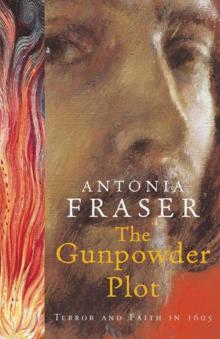 The Gunpowder Plot
The Gunpowder Plot Cromwell
Cromwell The Weaker Vessel: Women's Lot in Seventeenth-Century England
The Weaker Vessel: Women's Lot in Seventeenth-Century England Marie Antoinette: The Journey
Marie Antoinette: The Journey Oxford Blood
Oxford Blood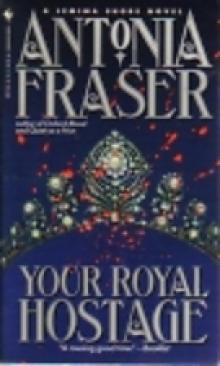 Your Royal Hostage
Your Royal Hostage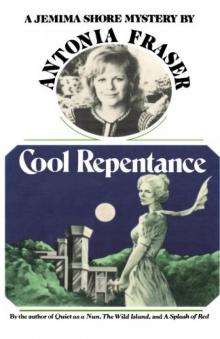 Cool Repentance
Cool Repentance Mary Queen of Scots
Mary Queen of Scots Political Death
Political Death Royal Charles: Charles II and the Restoration
Royal Charles: Charles II and the Restoration My History: A Memoir of Growing Up
My History: A Memoir of Growing Up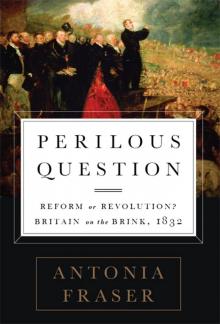 Perilous Question: Reform or Revolution? Britain on the Brink, 1832
Perilous Question: Reform or Revolution? Britain on the Brink, 1832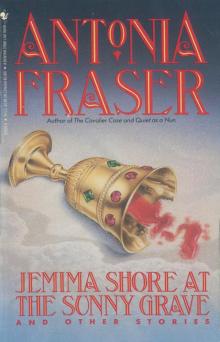 Jemima Shore at the Sunny Grave
Jemima Shore at the Sunny Grave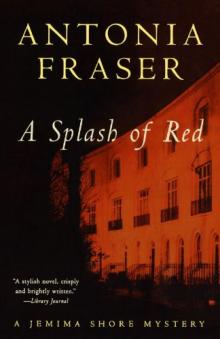 A Splash of Red
A Splash of Red Must You Go?: My Life With Harold Pinter
Must You Go?: My Life With Harold Pinter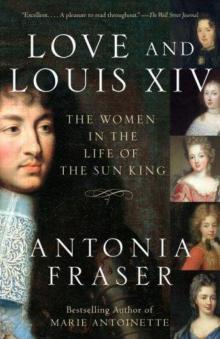 Love and Louis XIV: The Women in the Life of the Sun King
Love and Louis XIV: The Women in the Life of the Sun King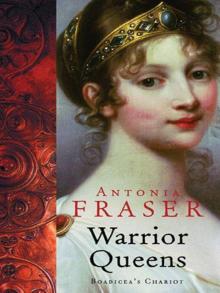 The Warrior Queens
The Warrior Queens The Wild Island
The Wild Island Quiet as a Nun
Quiet as a Nun Perilous Question
Perilous Question Cromwell, the Lord Protector
Cromwell, the Lord Protector Gunpowder Plots
Gunpowder Plots The Wild Island - Jemima Shore 02
The Wild Island - Jemima Shore 02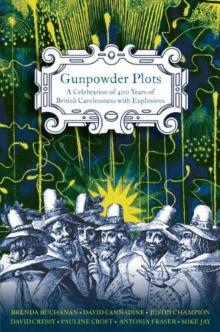 Gunpowder Plots: A Celebration of 400 Years of Bonfire Night
Gunpowder Plots: A Celebration of 400 Years of Bonfire Night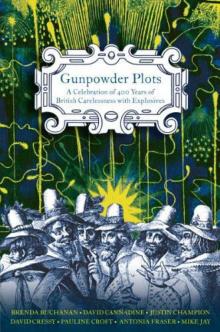 Gunpowder Plots_A Celebration of 400 Years of Bonfire Night
Gunpowder Plots_A Celebration of 400 Years of Bonfire Night Marie Antoinette
Marie Antoinette Must You Go?
Must You Go? My History
My History